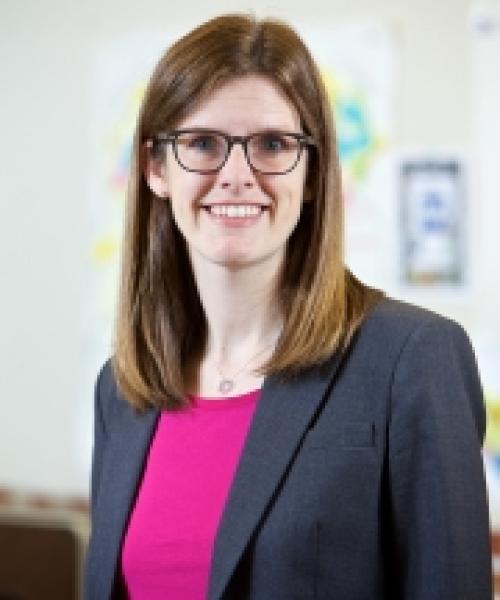
Research Interests
Katherine Lewis
I am a researcher and educator who is fundamentally concerned with designing accessible educational contexts – particularly for students with disabilities.
My primary line of research is focused on students with mathematics learning disability (i.e., dyscalculia). These students have a neurological difference in how their brains process numerical information that leads to significant difficulties learning and doing mathematics. Unlike most research on mathematics learning disabilities, I reject the deficit model and adopt a disability studies approach. I believe that individuals are not disabled by their physical, sensory, or neurological differences, but by inaccessible spaces and contexts. For students with mathematics learning disabilities, standard mathematical tools may not be equally accessible. In my work, I aim to identify the ways in which students’ unconventional understanding and use of mathematical representations results in issues of access. This theoretical orientation – informed by a Vygotskian perspective of disability – involves identifying students’ unconventional understandings as they occur in authentic learning environments, evaluating the accessibility of tools and instruction, and considering the ways students compensate to gain access. My research sits at the intersection of mathematics education and special education and begins to address the epistemological, theoretical, and pedagogical divides that have historically separated these fields.
My second line of research is concerned with designing educational supports for foster and adoptive parents. Children in the child welfare system, often struggle academically, and foster/adoptive parents must figure out how to support their children inside and outside of school. I am interested in working with foster/adoptive parents to problem solve and design innovative tools to support their children academically. I have created a website: foster-edu.com which provides resources for foster/adoptive parents during this time of home schooling and distance learning.
My third area of interest – one that I am only beginning to investigate – involves understanding the unique role that American Sign Language can play in supporting Deaf students’ understanding of mathematics concepts.
For more details about my work and recaps of my current research, please go to my research website (klewismath.com)
(she/her/hers)
Multimedia
- Linking Research and Practice Outstanding Publication Award from the National Council of Teachers of Mathematics, 2018
- National Academy of Education - Spencer Postdoctoral Fellow, 2015
- Early Career Publication Award of the Special Interest Group on Research in Mathematics, 2015
- Spencer Dissertation Fellowship, 2010
Lewis, K. E., Sweeney, G., Thompson, G. M., & Adler, R. (2020). Integer number sense and notation: A case study of a student with a mathematics learning disability. Journal of Mathematical Behavior. doi: 10.1016/j.jmathb.2020.100797
Lewis, K. E. & Lynn, D. L. (2018). Access through compensation: Emancipatory view of a mathematics learning disability. Cognition & Instruction 36(4), 424-459. doi: 10.1080/07370008.2018.1491581.
Lewis, K. E. & Lynn, D. L. (2018). An insider’s view of a mathematical learning disability: Compensating to gain access to fractions. Investigations in Mathematics Learning 10(3), 159-172. doi: 10.1080/19477503.2018.1444927.
Lewis, K. E. & Lynn, D. L. (2018). Against the odds: Insights from a statistician with dyscalculia. Special Issue of Education Sciences on “Dispelling Myths about Mathematics” edited by Jo Boaler. 8, 63. doi:10.3390/educsci8020063 -- open access --
Lewis, K. E. & Fisher, M. B. (2018). Clinical interviews: Assessing and designing mathematics instruction for students with disabilities. Intervention in School and Clinic. 53(5). 283-291. doi: 10.1177/1053451217736864
Lynch, S. R., Hunt, J. H., Lewis, K. E. (2018). Productive struggle for all: Differentiated instruction. Mathematics Teaching in the Middle School. 23(4),194-201.
Lewis, K. E. (2017). Designing a bridging discourse: Re-mediation of a mathematical learning disability. Journal of the Learning Sciences, 26(2). 320-365. doi: 10.1080/10508406.2016.1256810
Lewis, K. E. (2016). Beyond error patterns: A sociocultural view of fraction comparison error patterns in students with mathematical learning disabilities. Learning Disability Quarterly 39(4), 199-212. doi:10.1177/0731948716658063
Lewis, K. E. (2016). Understanding mathematical learning disabilities as developmental difference: A fine-grained analysis of one student’s partitioning strategies for fractions. Infancia y Aprendizaje, 39(4), 812-857. doi:10.1080/02103702.2016.1215085
Lewis, K. E. & Fisher, M. B. (2016). Taking stock of 40 years of research on mathematical learning disability: Methodological issues and future directions. Journal for Research in Mathematics Education, 47(4), 338-371. doi:10.5951/jresematheduc.47.4.0338
Schoenfeld, A. H. & Lewis, K. E., (2016). Becoming a researcher: A reflection. Journal of Education, 196(2), 63-69.
Lewis, K. E. (2014). Difference not deficit: Reconceptualizing mathematical learning disabilities. Journal for Research in Mathematics Education, 45(3), 351–396.
Mazzocco, M. M. M., Myers, G. F., Lewis, K. E., Hanich, L. B., & Murphy, M. M. (2013). Limited knowledge of fraction representations differentiates middle school students with mathematics learning disability (dyscalculia) versus low mathematics achievement. Journal of Experimental Child Psychology, 115(2), 371–387. doi:10.1016/j.jecp.2013.01.005
Lewis, K. E. (2010). Understanding mathematical learning disabilities: A case study of errors and explanations. Learning Disabilities a Contemporary Journal 8(1), pp. 21-30.
Saxe, G.B., Earnest, D., Sitabkhan, Y., Haldar, L.C., Lewis, K.E., & Zheng, Y. (2010). Supporting generative thinking about integers on number lines in elementary mathematics. Cognition and Instruction, 28(4), pp. 433-474.